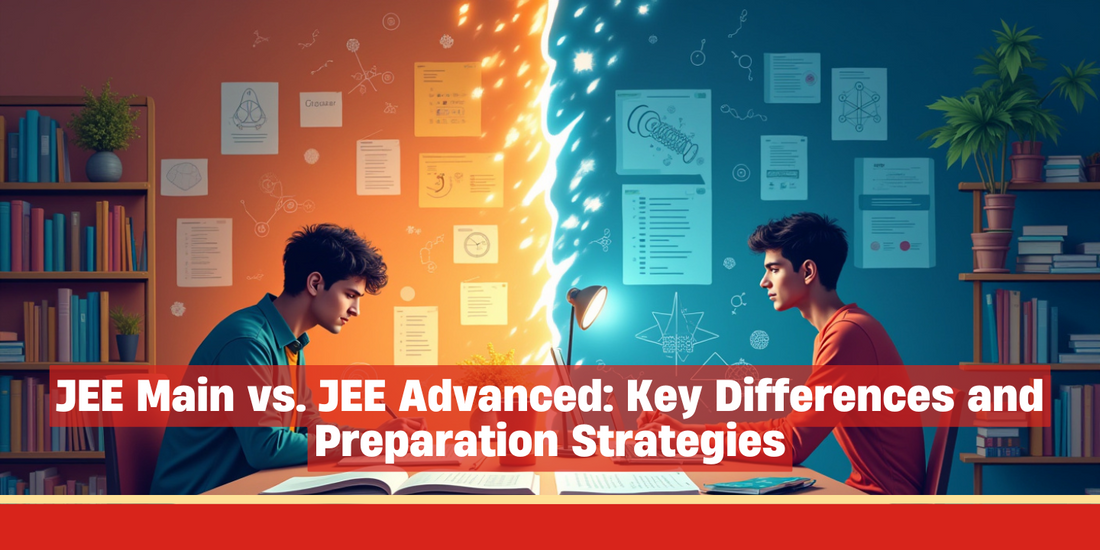The Joint Entrance Examination (JEE) is a pivotal assessment for engineering aspirants in India, serving as a gateway to esteemed institutions like the National Institutes of Technology (NITs) and the Indian Institutes of Technology (IITs). The examination is bifurcated into two distinct tests: JEE Main and JEE Advanced. Understanding the nuances between these exams is crucial for effective preparation and success.
Key Differences Between JEE Main and JEE Advanced
1. Purpose and Scope
JEE Main: Conducted by the National Testing Agency (NTA), JEE Main facilitates admissions to undergraduate engineering programs at NITs, IIITs, and other centrally funded technical institutions. It also serves as a qualifying exam for JEE Advanced.
JEE Advanced: Organized by one of the seven zonal IITs on a rotational basis, JEE Advanced is exclusively for candidates aiming for admission into the IITs. Only top performers in JEE Main are eligible to appear for this exam.
2. Eligibility Criteria
JEE Main: Candidates must have completed their Class 12 examination from a recognized board. There is no age limit, and students can attempt the exam in three consecutive years.
JEE Advanced: Eligibility is restricted to the top 2,50,000 rank holders in JEE Main. Candidates are allowed a maximum of two attempts in consecutive years.
3. Exam Structure and Pattern
JEE Main:
Papers: Two papers—Paper 1 for B.E./B.Tech and Paper 2 for B.Arch/B.Planning.
Mode: Computer-based test.
Duration: 3 hours.
Question Types: Multiple Choice Questions (MCQs) and Numerical Value Questions.
Subjects: Physics, Chemistry, and Mathematics.
Know More about JEE Mains Coaching
JEE Advanced:
Papers: Two compulsory papers—Paper 1 and Paper 2.
Mode: Computer-based test.
Duration: Each paper is 3 hours.
Question Types: A mix of MCQs, numerical questions, and match-the-following types.
Subjects: Physics, Chemistry, and Mathematics.
4. Syllabus
JEE Main: Aligns closely with the Class 11 and 12 CBSE syllabus, covering fundamental topics in Physics, Chemistry, and Mathematics.
JEE Advanced: While it encompasses the JEE Main syllabus, it delves deeper into subjects and includes additional topics, necessitating a profound understanding and application of concepts.
5. Difficulty Level
JEE Main: Considered to assess the candidate's grasp of basic concepts and their application.
JEE Advanced: Known for its complexity, it evaluates a candidate's analytical skills, conceptual depth, and problem-solving abilities.
Preparation Strategies for JEE Main and JEE Advanced
Achieving success in these competitive exams requires tailored strategies:
1. Understand the Exam Pattern and Syllabus
JEE Main: Focus on mastering the NCERT textbooks to build a strong foundation. Practice with previous years' papers to familiarize yourself with the question patterns.
JEE Advanced: Beyond NCERT, refer to advanced books and materials. Engage in solving complex problems and conceptual questions to enhance analytical thinking.
2. Time Management
JEE Main: Develop the ability to solve questions swiftly and accurately. Regular timed practice sessions can aid in achieving this.
JEE Advanced: Allocate time to tackle intricate problems that require deeper analysis. Practice managing time effectively during mock tests to simulate exam conditions.
3. Mock Tests and Regular Assessments
JEE Main: Participate in mock tests to identify strengths and areas needing improvement. Regular assessments help in tracking progress and adjusting study plans accordingly.
JEE Advanced: Engage in advanced-level mock tests that challenge your problem-solving skills and conceptual understanding. Analyze performance to refine strategies.
4. Focus on Conceptual Clarity
JEE Main: Ensure a solid grasp of fundamental concepts, as questions often test basic understanding.
JEE Advanced: Aim for in-depth knowledge and the ability to interlink concepts across subjects, facilitating the solving of multifaceted problems.
5. Consistent Revision
JEE Main: Regularly revisit topics to reinforce learning and retain information.
JEE Advanced: Incorporate revision sessions that challenge your understanding and application of concepts in novel scenarios.
Conclusion
Both JEE Main and JEE Advanced are integral steps for engineering aspirants in India. While JEE Main opens doors to numerous prestigious institutions, JEE Advanced is the key to entering the esteemed IITs. A clear comprehension of the differences between these exams, coupled with a strategic and dedicated preparation approach, is essential for success. Tailoring your study plan to meet the specific demands of each exam will enhance your prospects of achieving your engineering aspirations.
Get expert mentorship, proven strategies, and comprehensive study material at the best IIT-JEE coaching center in Pimpri Chinchwad or our other branches near you - start today!










